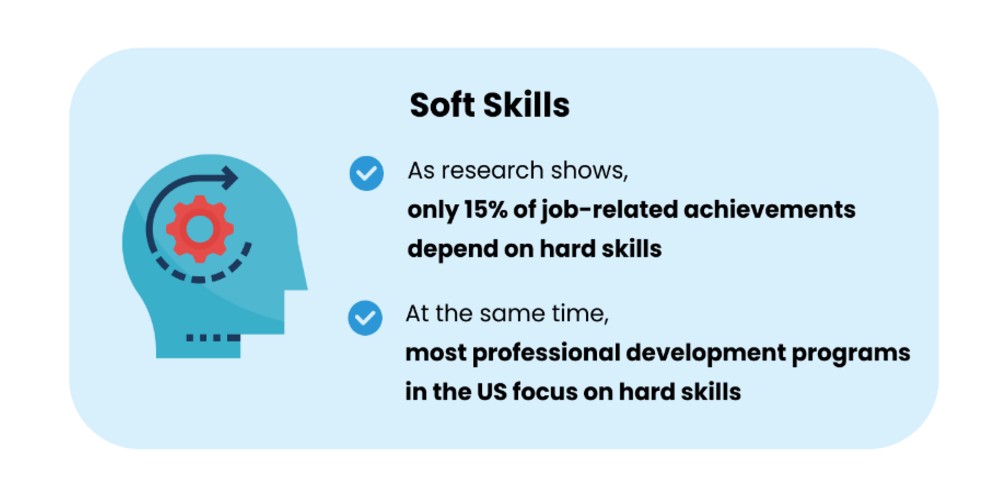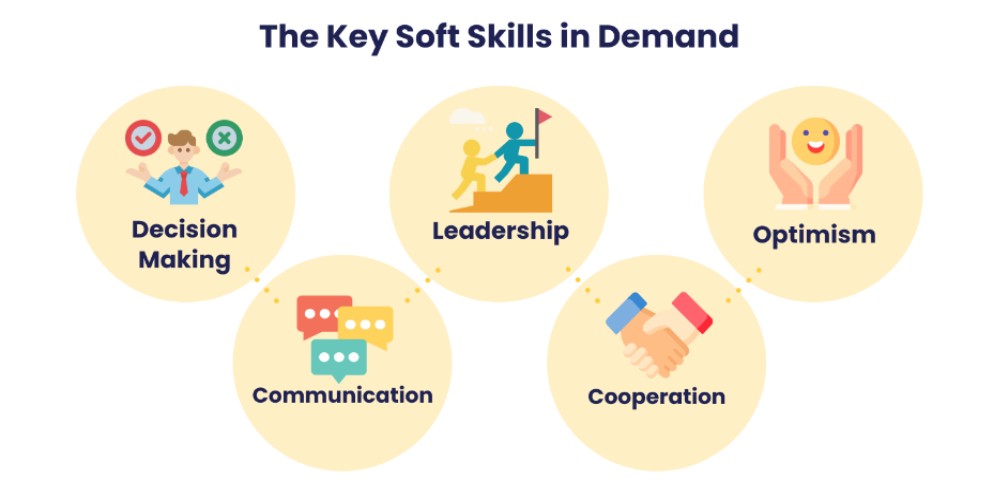In 1918, the Carnegie Foundation published A Study of Engineering Education. This research found that only 15% of job-related achievements depend on a person’s knowledge and technical skills. As much as 85% of success in the workplace is due to soft skills. The irony of these numbers is that they are over 100 years old, but they still apply.
Nowadays, workers are becoming more critical of the evolution of economics, the mechanization of manual labor, and the personalization of goods and commodities. Some have predicted that over 40% of business tasks will rely on robotic automation or AI by 2023. Meanwhile, more than 70% of professional development programs in America are focused on hard skills. Professionals are expected to dedicate their personal time and resources to develop soft skills.

- What are the soft skills that are currently in high demand?
- How can you market your abilities to potential employers?
- How should you include your strengths in your resume?
- How can you develop your soft skills to become successful in life?
Below you will find detailed answers to these questions.
❓ What Are Soft Skills?
Soft skills are also called emotional intelligence, or EI. They measure how flexible, social, empathetic, and motivated you are.
The easiest way to understand soft skills is by comparing them with hard (or “technical”) skills. Imagine you have a leaky faucet. You hire a plumbing specialist to fix it, but when the man enters, he does not greet you. When the work is done, he says, “Give me my money.” He leaves, slamming the door. Meanwhile, he did his job perfectly well. Would you hire him again? Not likely. You would probably look for another plumber with more emotional intelligence.
This fictional situation illustrates the importance of soft skills in daily life. A plumber’s ability to use the grip wrench is a hard skill. At the same time, his ability to communicate with his clients is a soft skill.
Why Are Soft Skills Important?
Companies hire people based on their qualifications and knowledge (i.e., hard skills), but they often dismiss employees because of a lack of soft skills.
Emotional intelligence is essential in any environment. It makes you a comfortable speaker and an easy-going person. Strengthening your EI will help remove drama from your personal life and make you happier.
Psychologists consider soft skills to be the opposite of hard skills, which are tangible and easily evaluated. People perceive EI as a set of subjective factors about a person, but this view doesn’t give them the importance they deserve. Due to their subjectiveness, soft skills are often disregarded during the hiring process. But, for example, it’s better for a manager to understand how to motivate people and organize teams than it is to have technical know-how. Hard skills can be learned, but no employee with poor soft skills can become a successful leader.
Modern Human Resource departments know that a professional with a lack of soft skills is like a time bomb. More often than not, candidates with less knowledge and professional history but greater emotional intelligence are chosen instead of more experienced candidates with fewer soft skills. Those with high EI know how to motivate themselves and inspire their coworkers. A healthy emotional atmosphere at the workplace increases the general productivity of any business.
🔑 The Key Soft Skills in Demand
Which qualities do you need to become a sought-after employee and a high-performance student? There are five groups of skills: decision-making, communication, leadership, cooperation, and optimism. Each is important and relates to the others in unique ways.

Decision Making
The bigger the company, the harder it is to control every decision. As an employee, if you can analyze a situation independently and find what works well and what doesn’t, then you are a valuable asset. According to a PayScale survey, more than 60% of graduates lack critical thinking skills. Developing this ability doubles your chances of getting a well-paid job. Problem-solving skills are mainly used as a synonym for critical thinking, but they include more aspects as well.
- Logical reasoning helps us to follow another person’s train of thought. With this skill, you can examine separate details and find a link between them. Logic also encourages you to remove your emotional perception in conflict situations. A cool, rational approach works better when the situation has escalated. When you are on the verge of losing your temper, try to examine the reasons for your anger. Logical thinking can help you to cool down and compose yourself, allowing you to make better decisions.
- Critical thinking helps us to find the pros and cons of any situation. Being skeptical of problems and their solutions develops your critical thinking skills and helps to find new, better ways of completing habitual tasks.
- Curiosity is the least expected skill when it comes to decision making. Still, being curious keeps you open-minded and ready to practice empathy. Curious people search for innovative solutions to old problems, and as they say, where’s a will, there’s a way.
- Creativity is intimately tied to curiosity. This skill helps you to combine ideas to develop new, unique solutions to common problems. To be creative, you must pay attention to details and practice introspection. Businesses often use brainstorming techniques to boost their employees’ creativity.
Communication
We learn to speak when we are about three years old, but we continue to develop our communication skills throughout our lifetime. To be an effective communicator, you need to understand the balance between what should and should not be said. A verbal exchange is only successful if each participant thoroughly conveys their thoughts and is correctly understood. Below, you can find a list of communication skills that are critical for both students and professionals.
- Non-verbal communication includes your body language, tone of voice, facial expression, etc. It is a powerful means to hold the attention of your audience. For this reason, non-verbal skills are essential for teachers, public figures, and any person who aspires to become a leader. The following abilities are important examples of non-verbal communication:
- Posture
- Expression
- Mimics
- Gestures
- Active listening
- Verbal communication skills are used when you speak. They are critical for jobs that require extensive telephone and in-person communication, including customer service support, sales managers, HRs, and educators. For students, these soft skills often define academic performance. The following examples are essential to verbal communication:
- Conversation etiquette
- Articulation
- Public speaking
- Presentation
- Written communication is more than writing messages and emails. The ability to write well highlights your intelligence, and the opposite is true too. We almost always communicate through email or messages to arrange meetings or resolve follow-up questions. Thus, the following abilities help mold your image as a professional:
- Emailing
- Content management
- Content strategy
- Editing
- Correspondence
- Advertising
- Speech writing
- Business storytelling
- Conflict management is the most challenging skill to master. It involves resolving problems between other people whose behavior is hard to predict. Multinational companies always look for people who are able to reconcile conflicts, especially between cultures and worldviews. The following list details aspects of conflict management:
- Diplomacy
- Politeness
- Friendliness
- Negotiation and persuasion
- Open-mindedness
- Empathy
Leadership
A prominent leader has specific qualities that make them stand out, including the ability to motivate people, instill confidence in their team, and inspire their employees to do their job with passion. Leaders are ready to take risks and bear responsibility for the outcome. They are quick problem-solvers, which is crucial in today’s constantly changing world.
- Delegation is a skill that needs to be trained. Leaders who do not delegate tasks can quickly become overwhelmed and experience professional burnout. A proficient leader should know the strengths of their staff and be able to assign specific tasks to the right people.
- Integrity manifests itself in strong ethical and moral principles. Moreover, integrity facilitates mutual understanding between people, which benefits everyone. In business, it is essential to know what to expect from your leaders because they are the ones who dictate the rules.
- Coaching is important for leaders in terms of motivation. If you control your company’s performance by punishing those who fail to complete a task, your leadership is lacking. Proper coaching encourages your subordinates to overcome their obstacles. It makes people believe in their strengths and work on their weaknesses to become better professionals.
- Building relationships is a must for any leader. Our world depends on human interaction. The more people you know and can call upon in a complicated situation, the more successful you will be. This skill needs a long-term mindset, but it brings high dividends with it.
- Self-management is the ability to be your own boss. Time-management is a critical part of this skill. Successful leaders plan their days, weeks, and years. That is why you are often asked to include your plans for the distant future in your resume.
Cooperation
Very few jobs do not require cooperation. In most cases, you are supposed to engage in teamwork, whether you like it or not. The COVID-19 pandemic has taught us to cooperate online. The importance of time zones and geographic locations is fading. Employers expect you to recognize diversity and use it for the benefit of the team. You also should be able to give rational feedback and listen without becoming antagonistic.
- Teamwork means that you know how to distribute duties and take responsibility for your share of work. It also comprises the ability to work on the same task with other people. This is not always as simple as it seems. You often need to respect another person’s point of view and professional experience even when you disagree.
- Feedback competence helps you to offer criticism politely and receive it about your work. We often overlook our flaws and mistakes. Detaching your mind from your emotions can reveal what needs improvement.
- Diversity awareness means that you appreciate and understand the differences between people, including those with disabilities. The best approach is to ignore the traits that limit our communication and focus instead on our commonalities. Besides, most aspects of diversity contribute to curiosity and creativity.
- Corporate culture awareness is applicable to any situation in life that involves a group of people. Colleges also have their internal culture that their members recognize and observe. When in Rome, do as the Romans do.
Optimism
Optimism is contagious, often bringing a positive attitude to everyone around you. All the skills above are useless if you don’t believe in your success. The following features characterize an optimistic person.
- Respectability and respectfulness manifest themselves in the ways you treat people, and people treat you. They are often a consequence rather than a cause of optimism, but they can also be developed as skills. Show respect to others, establish your boundaries, and defend them.
- Friendliness makes you a pleasant interlocutor and a “nice person.” Being courteous and open to conversations with strangers can encourage people around you to be friendlier as well.
- Enthusiasm is often regarded as a trait you are born with, but it can also be developed with practice. It stems from the belief in a positive outcome as well as a proactive approach to life. Enthusiasm also depends on self-motivation and personal energy levels.
- Humor is a communication facilitator. It raises team spirits and makes any interaction more pleasant. Humor is one of the most complicated psychological techniques, but it can be learned.
🚀 12 Ways to Develop Your Soft Skills
Is there a way to build soft skills? Yes, there are many ways, which will all help you become a more valuable professional and a better person. Emotional intelligence goes beyond the technical domain, so a textbook and a pen will not do for this purpose. Remember that soft skills are not optional; they are vital. Do not shift the responsibility for their development to your employer, teacher, or life coach.
- Learn even when it seems like you’re wasting your time. All learning is cyclical. While improving any skill, you will come across many setbacks as well as successes. In either case, do not stop trying. Success is not equal to excellence, and a setback does not mean failure.
- Communicate whenever you can. When you want to learn to play the piano, you play it over and over again. If you would like to acquire communication skills, you can do it only by practicing communication techniques. Ask people for help, how they spent their vacation, or about their interests. Evaluate the conversations later. What did you say correctly, and what could have been better? How clear was your message? Were your body language and tone of voice appropriate?
- Find a role model. Nobody is perfect, but some people have that mystical trait we call charisma. It seems they naturally know what to do in any given social environment. Their reactions are to the point, and they feel in their element. If you analyze their behavior patterns, you will find a lot worth learning.
- Welcome any feedback. Most people receive feedback as unwanted advice. But if you are wise, you will accept it with appreciation. Not all feedback is accurate or worth analyzing, but you will know the difference. Every time someone comments on your work, think about what they said and what you can learn from their statement. Develop a plan for improving what they criticized.
- Adapt to changes. Harvard Health Publishing recommends challenging your brain to help it grow. Our life is changing many times faster than the life of our grandparents did. Use this to your benefit and develop flexibility and open-mindedness. Adaptability is useful because it teaches you to invent alternative solutions to any issue. Dedicate your time to mastering new technologies. It will save you time later.
- Never avoid teamwork. For many of us, it seems more convenient to do everything on our own, but this means we don’t develop our ability to cooperate. You need to learn how to manage tasks and share responsibilities. Successful teamwork at college or university facilitates your learning process and teaches you a priceless skill for your future job. Cooperate with your classmates even when the teacher does not require you to do so. Share tasks and prepare presentations together.
- Build a network of relationships. Keep in touch with people with whom you feel comfortable. Most of the soft skills you use come from the relationships you have with your friends. Positive communication makes you a happier person and a skilled speaker. Extend your social circle through shared experiences. Large companies use this strategy at team building events. If you are a student, arrange extracurricular activities to strengthen and develop friendships. When you do something new together, you see how different personalities learn and how they react to various factors. This will help you as a future leader and professional.
- Leave your comfort zone as soon as possible. This does not mean moving to the woods and abandoning civilization. But it does mean that you should face your fears. If you are afraid of public speaking, attend the respective training courses. Meet new people, undertake new responsibilities and leadership roles. At work, placing yourself in an unfamiliar setting demonstrates your determination to your manager.
- Observe others. You already know which soft skills are essential for your emotional intelligence. Watch how other people cope with complicated life situations. Analyze their mistakes and do your best not to repeat them. Note how they interact with friends, relatives, coworkers, and classmates. Everyday communication is the best place to train your emotional intelligence. It’s a good idea to make a list of the people you know and their soft skills.
- Analyze each conflict as a referee. Everyone has conflicts once in a while. If you analyze such cases like a psychologist, you will discover other people’s patterns and habits. This knowledge will help you settle complicated conflicts and remain on good terms with everyone. A peaceful environment fosters productivity in work and education. This method also trains your leadership abilities.
- Be a leader. To develop your leadership skills, it is not necessary to take a managerial position. Tell your instructor or manager that you want to lead a project or mentor newcomers. As a rule, few people want to dedicate time and effort to control the effectiveness of others and motivate them. This means, however, that you will never face much competition to take on those roles. Be proactive, and opportunities to develop your leadership skills will show up sooner than you expect.
- Commit to doing everything on time. Time management skills do not come by themselves. Some people develop them in childhood because of strict parenting. But not all of your childhood habits extend into adult life. Following a schedule will show you how much time can be saved if you have a plan. As a bonus, this approach will make you more proactive and decisive.
🤑 How to Sell Your Soft Skills: 2 Steps
Step #1: Identify Your Strengths
- Ask others. The fastest way to receive criticism concerning your work is to ask those who deal with its results. Some people will be too shy to offer their opinions, but if you ask, they will give you valuable insights that you would have never noticed otherwise.
- Analyze feedback. You can find out what kind of person you are by listening to feedback about your work. People who interact with you every day are the most reliable source of useful criticism and praise. Which aspects of your effort are appreciated? These are your strengths.
- Think of your passions. When you do what you enjoy, you develop your abilities more quickly. Discover what inspires you and follow your passion. If there is something you do well, dedicate more time to it. In this way, you will become better at these activities. Meanwhile, do not waste your time on things you struggle with. Delegate them or find another way to cope with them quickly.
- Take a personality test. There are lots of career guidance and personality tests. Even if they are not always accurate, taking several ones will show you the general tendency of your personality. You will figure out the areas in which you are well-developed and will also identify your weak points. Many American companies use MBTI personality tests to hire appropriate candidates.
Step #2: Show off Your Soft Skills on Your Resume
- List only the skills required for a particular job. Ignoring this rule tells the employer that you are inattentive to details and disrespectful of other people’s time. Select which of your strengths applies to the vacancy. The following list contains examples of key soft skills for specific job openings:
- Sales and customer support managers:
- Respect
- Empathy
- Active listening
- Verbal and non-verbal communication competence
- Constructive feedback
- Conflict management
- Software engineers, market research specialists, event coordinators:
- Delegation of activities
- Logical reasoning
- Teamwork
- Idea exchange
- Negotiating
- Diversity awareness
- Mediation
- Public relations experts, nurses, social workers:
- Self-management
- Curiosity
- Positive thinking
- Self-motivation
- Critical thinking
- Empathy
- Healthcare, law enforcement, and IT specialists:
- Logical reasoning
- Proactiveness
- Persistence
- Attention to details
- Negotiation
- Decision-making
- Architects, artists, designers:
- Creativity
- Unconventional thinking
- Questioning
- Mind mapping
- Innovativeness
- Experimenting
- Sales and customer support managers:
- Never make unsubstantiated statements. If you consider that you have a given skill, illustrate it. If it is inconvenient to do so in your resume, be sure to write an explanation in your cover letter. Every time you add a soft skill to your CV, consider why you think it applies to you. Try to use more specific characterizations than just “skilled manager” or “experienced communicator.”
As you can see, soft skills are more than just knowing how to read and write. We are social creatures, and our happiness depends largely on the “success” of our interaction with other people. The information above can be the first step to improving your communication at home, work, or college. You will become a valuable asset in business if you show emotional intelligence.
How do you develop your soft skills? Do you know about any online training that helps develop emotional intelligence? Please share your know-how in the comments below.
![Unexpected Career Tips from Celebrities [2026 Edition]](https://custom-writing.org/blog/wp-content/uploads/2021/01/Career-tips-title-1-284x153.jpg)






![Internship Essay: Example & Complete Writing Guide [2026]](https://custom-writing.org/blog/wp-content/uploads/2020/12/internship-student-e1565190155561-284x153.jpg)


![3 Scholarship Essay Examples about Yourself [2026]](https://custom-writing.org/blog/wp-content/uploads/2020/12/closeup-hand-student-holding-pencil-284x153.jpg)
